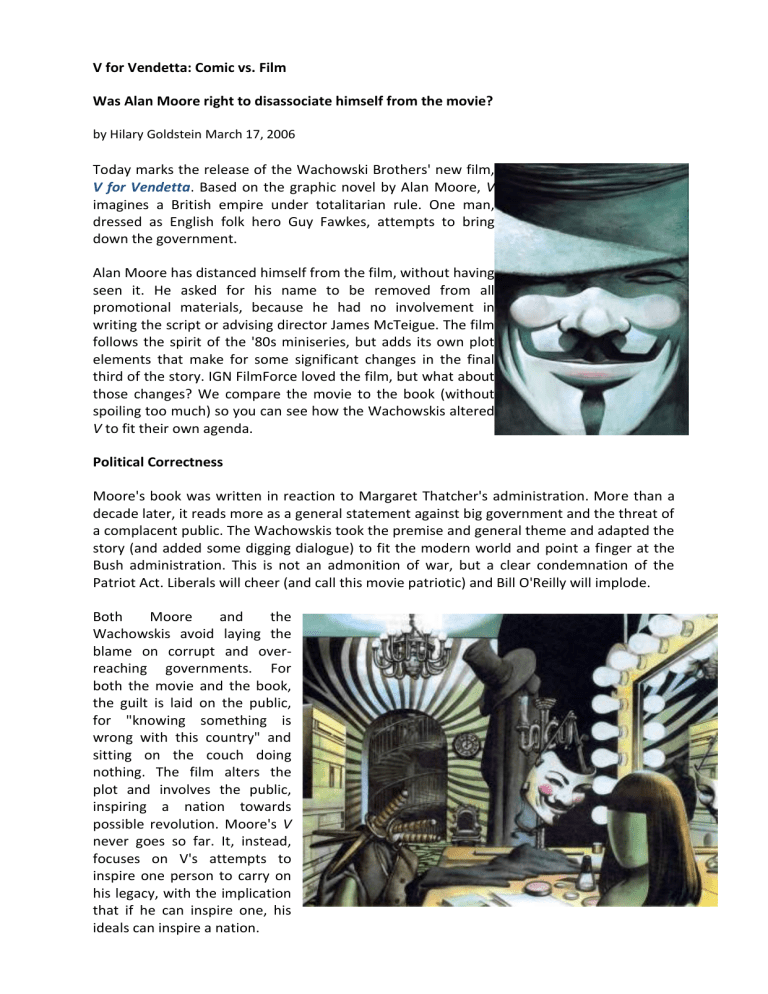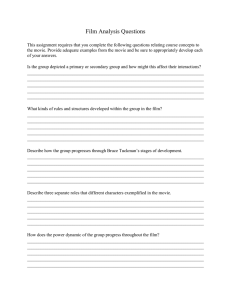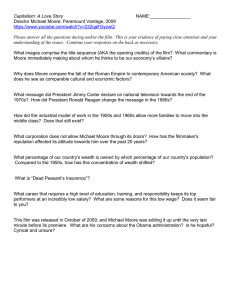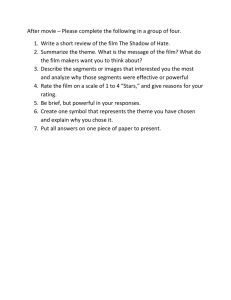
V for Vendetta: Comic vs. Film Was Alan Moore right to disassociate himself from the movie? by Hilary Goldstein March 17, 2006 Today marks the release of the Wachowski Brothers' new film, V for Vendetta. Based on the graphic novel by Alan Moore, V imagines a British empire under totalitarian rule. One man, dressed as English folk hero Guy Fawkes, attempts to bring down the government. Alan Moore has distanced himself from the film, without having seen it. He asked for his name to be removed from all promotional materials, because he had no involvement in writing the script or advising director James McTeigue. The film follows the spirit of the '80s miniseries, but adds its own plot elements that make for some significant changes in the final third of the story. IGN FilmForce loved the film, but what about those changes? We compare the movie to the book (without spoiling too much) so you can see how the Wachowskis altered V to fit their own agenda. Political Correctness Moore's book was written in reaction to Margaret Thatcher's administration. More than a decade later, it reads more as a general statement against big government and the threat of a complacent public. The Wachowskis took the premise and general theme and adapted the story (and added some digging dialogue) to fit the modern world and point a finger at the Bush administration. This is not an admonition of war, but a clear condemnation of the Patriot Act. Liberals will cheer (and call this movie patriotic) and Bill O'Reilly will implode. Both Moore and the Wachowskis avoid laying the blame on corrupt and overreaching governments. For both the movie and the book, the guilt is laid on the public, for "knowing something is wrong with this country" and sitting on the couch doing nothing. The film alters the plot and involves the public, inspiring a nation towards possible revolution. Moore's V never goes so far. It, instead, focuses on V's attempts to inspire one person to carry on his legacy, with the implication that if he can inspire one, his ideals can inspire a nation. The film ends with a rousing and, quite sincerely patriotic, finale far distanced from the book. It's not a matter of one being better than the other -- they are too different to compare fairly. But if you want something that will make you believe, at least for 2 hours, that you are going to do something about US policy, the movie will treat you better than the book. The Fourth Reich Both film and comic book feature a fascist government that seized power after a devastating war. Once in power, the government began rounding up those who were "different." That means anyone who isn't a white, Christian heterosexual. In both mediums, the gathered were sent without due process to camps, where they were eventually executed. The film uses some modern-day references, so that viewers won't miss the Wachowskis attempts to draw parallels to the US' various military holding facilities, such as the terrorist prison at Guantanamo Bay. When you are taken away -- either for being different or speaking out against the government -- a black bag is thrown over your head and you are essentially erased from the world. The black bags are specific to the movie and are quite chilling, recreating the familiar image of some infamous US internment photos. In the movie, the government is more sinister. Moore's book has an evil regime for sure, but its ruler is a much more fleshed-out character, something that humanizes the evil empire. The film's leader, played by John Hurt, is an amalgamation of various dictators and appears almost exclusively on a giant screen. As for the media, which plays a key role in modern-day politics, it too has a profound influence in both the book and film. Moore gives us the "Voice of Fate," the one voice all of England knows to trust implicitly. The Wachowskis take a more direct shot at American newscasters, with government officials working hand-in-hand with broadcasters to shape the news. Cover-ups are an easy thing when, according to the film, the public knows to never trust the government, but always trust the news. Dirty People Where the film does a better job of creating a horrifying vision of government, the comic book does a much better job with its characters. Evey (Natalie Portman) of the film is a twenty-something strong-minded and well-read woman trying to make something of her self despite a troubled past. Evey of Moore's V is a sixteen-year-old streetwalker with little education and no immediate inclination to ever act out against the government. The two Eveys are an incredible contrast. An adult who is taken in by a terrorist (or, from another perspective, a revolutionary) is quite different than an under-aged girl seemingly held against her will and eventually converted to a martyr's cause. Still, the Wachowski Brothers cast Natalie Portman in the role, no doubt because of her work in The Professional, where she starred as a character similar to Evey. Beyond Evey, most every other character shares the same name and job as in the comic book, but are also changed considerably. Stephen Rea plays Finch, a detective heading the V case. He's tasked with stopping the madman from bombing more of London. In the book, Finch is nearly disgraced by his failings to stop V and takes LSD in order to get into the criminal's state of mind. He is not a sympathizer. The film shows much more of Finch and adds a huge government cover-up, allowing Finch to awaken to the government's malice. While Moore's Finch seems ambivalent about a final confrontation with V, the film version of Finch forces a very Hollywood type of choice -- Stop the terrorist, whom he knows is right, or ignore his duty and allow for revolution. Even the title character is altered for the film. V's face remains a mystery, but McTeigue and the Wachowskis go to great lengths to humanize the character. This is opposite the comic book, which shows V attempting to be inhuman and mannequin-like in his actions. Moore's V is only allowed emotion in rare moments, mainly in rage. He's cold, calculated, a man who believes he is bigger than his own humanity. The film V cooks Evey breakfast, watches movies and has a far more intimate relationship. In both cases he is using Evey. Don't fault the Wachowski Brothers for this. A movie is a different medium than a comic book and having an emotionless man in a mask on screen for two hours would not be an easy sell. For its themes and its purpose, the more human (and less insane) V of the film is a good fit. That same characterization would have lessened Moore's work. Breaking It Down If you want a "winner" for the better material, you won't find it here. Moore's work has greater depth. It shows a dirty world with ugly, fully-realized characters. But the film shows a more vile government, while focusing on drawing parallels with US policies. The characters are interesting, but somewhat trussed up to meet Hollywood movie standards. The film and the book have different goals and both succeed in their own right. If you have recently read V for Vendetta and come into the film expecting a fully faithful translation, you'll be disappointed. If you can separate the film from Moore's work and accept it as having been "inspired by" the graphic novel, you'll find an entertaining and politically charged movie. Likely your enjoyment of the movie depends on your political leanings. Conservatives may have a tough time getting past the heavy-handed message, while those who fall outside the 34% approval rating might find something to cheer. V was better than expected and though it greatly changes the plot for the last third of the story, it's a good film worth seeing. Unless you are Alan Moore. If you're Alan Moore, you probably don't want to watch this. Otherwise, enjoy.



